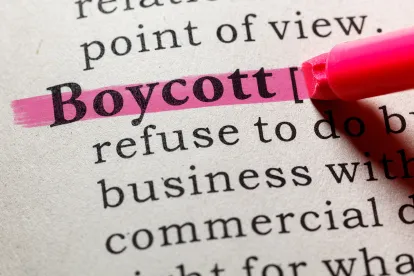The U.S. antiboycott laws and regulations have been around since the era of disco. In stark contrast to fast-moving sanctions and export controls, we rarely see updates to the antiboycott regulations or enforcement strategies. Last October, however, the Department of Commerce, Bureau of Industry and Security (BIS) announced enhancements to its antiboycott enforcement strategy. As part of its implementation of this updated enforcement strategy, BIS has both expanded the scope of required antiboycott reports and flagged antiboycott compliance specifically for government contractors. These moves demonstrate how BIS plans to focus its enforcement efforts on Federal contractors.
Antiboycott refresher
The U.S. government created antiboycott laws and regulations to counter the Arab League boycott of Israel and other unsanctioned foreign boycotts against countries considered friendly to the United States. These laws and regulations apply to all U.S. companies and subsidiaries (including outside of the United States). Both the Departments of Commerce and Treasury administer and enforce these regulations. There are large overlaps (with some significant differences) between compliance with these sets of regulations, but for purposes of this article, we focus on BIS antiboycott compliance.
The BIS antiboycott regulations prohibit U.S. companies from refusing to do business with a boycotted country or with blacklisted persons, any implementation of letters of credit that include prohibited boycott-related terms, and evasion of those restrictions. BIS readily provides examples of common boycott requests, though requests can take many forms. The regulations also require U.S. companies to report the mere receipt of boycott requests, written or verbal, to take certain actions to comply with, further, or support an unsanctioned foreign boycott.
BIS adds new antiboycott reporting requirement
For years, BIS only required U.S. companies to report that a request was received and the country from which the request originated. As of July 26, 2023, BIS also requires companies to report the specific party who made the prohibited antiboycott request. BIS intends the enhancement to further strengthen antiboycott enforcement efforts, hold responsible parties accountable, and diminish participation by U.S. companies in boycott-related activities.
BIS flags antiboycott compliance for government contractors
In addition, BIS also released a notice on SAM.gov and on the Office of Acquisition Management (OAM) flagging antiboycott compliance to the attention of Federal government contractors. In the notice, BIS directs contractors to review the antiboycott regulations to heed any applicable prohibitions on their companies and their federal government contracts.
Following these updates, we expect to see BIS use the new party reporting data to increase enforcement efforts and for BIS to focus its antiboycott enforcement efforts more closely on Federal contractors. Keep in mind, too, that Federal contractors (including commercial companies) doing business with the Department of Defense also must certify (via DFARS 252.225-7031) that they are not participating Secondary Boycott of Israel by Arab countries. Given the newfound enforcement focus of BIS, it is particularly important that Federal contractors ensure their certification under DFARS 252.225-7031 is accurate.




 />i
/>i

